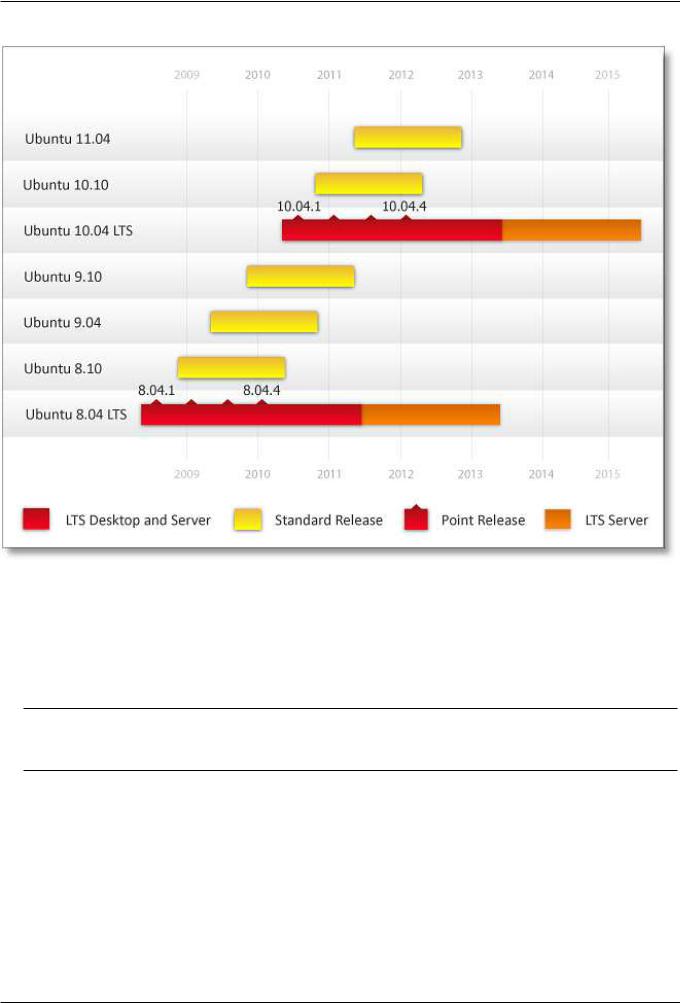
- •Introducing Ubuntu
- •About Open Source
- •Free Software Movement, Open Source and Linux
- •The Free Software Movement
- •The Open Source Movement and Linux
- •About Ubuntu
- •The Ubuntu Promise
- •Ubuntu Versions
- •Ubuntu Derivatives
- •Ubuntu Development and the Community
- •Ubuntu and Microsoft Windows: Key Differences
- •Installation
- •Applications
- •Lesson Summary
- •Review Exercise
- •Exploring the Ubuntu Desktop
- •Ubuntu Desktop Components
- •Changing the Default Language
- •Creating a User Account and Fast User Switching
- •Adding/Removing Applications
- •Desktop Effects - Compiz Fusion
- •Lesson Summary
- •Review Exercise
- •Lab Exercise
- •Using the Internet
- •Connecting to and Using the Internet
- •Network Manager
- •Using a Cable Connection
- •Using a Wireless Card
- •Browsing the Web
- •Using an RSS feed reader
- •Liferea Newsreader
- •Using Evolution Mail
- •Instant Messaging
- •Making Phone Calls Using Softphones
- •Using Ekiga
- •Skype
- •Lesson Summary
- •Review Exercise
- •Lab Exercise
- •Performing Basic Spreadsheet Tasks
- •Performing Basic Drawing Operations
- •Creating and Editing Formulae
- •Additional Applications
- •GnuCash Accounting
- •Lesson Summary
- •Review Exercise
- •Lab Exercise
- •Ubuntu and Games
- •Installing Games on Ubuntu
- •Installing a Game from a Repository
- •Playing Ubuntu Games
- •Playing PlanetPenguin Racer
- •Playing Other Popular Games
- •Installing Wine
- •Playing a Microsoft Windows Game on Ubuntu
- •Lesson Summary
- •Review Exercise
- •Lab Exercise
- •Customising the Desktop and Applications
- •Introduction
- •Customising the Desktop
- •Changing the Background
- •Customising the Theme (Buttons & icons etc)
- •Customising a Screensaver
- •Customising the Screen Resolution
- •Working with Files Using Nautilus
- •Features of Nautilus
- •Nautilus
- •Package Managers
- •Types of Package Managers
- •Using Add/Remove Applications
- •Using Synaptic Package Manager
- •Installing a Single Package File
- •Installing/Uninstalling Debian Packages
- •Software Repositories
- •Software Repository Categories
- •Adding New Language Settings
- •Lesson Summary
- •Review Exercise
- •Lab Exercise
- •Making The Most of Images and Photos
- •Introducing Graphics Applications
- •Viewing and Managing Photos with F-Spot
- •Viewing Photos
- •Organising Photos
- •Removing Red Eye
- •The GIMP
- •Drawing with Inkscape
- •Installing Inkscape
- •Creating Vector Graphic Images Using InkScape
- •Using a Scanner
- •Checking Scanner Compatibility
- •Scanning an Image
- •Lesson Summary
- •Review Exercise
- •Lab Exercise
- •Playing Music and Videos
- •Legal Restrictions
- •Playing Music Files
- •Playing Music using Rhythmbox
- •Playing and Extracting Audio CDs
- •Playing Audio CDs
- •Extracting Audio CDs
- •Burning Audio CDs
- •Playing Proprietary Multimedia Formats
- •Using an iPod
- •Playing Music Using an iPod
- •Creating and Editing Audio Files
- •Creating Audio Files
- •Editing Audio Files
- •Playing DVDs
- •Playing DVDs in Totem Movie Player
- •Backing up DVDs
- •Playing Online Media
- •Watching Videos in a Web Browser
- •Editing Videos
- •Editing videos using Pitivi video editor
- •Lesson Summary
- •Review Exercise
- •Lab Exercise
- •Ubuntu Help and Support
- •Introduction
- •System Documentation
- •Online Documentation
- •Community Support
- •Mailing Lists
- •Web Forums
- •IRC Channels
- •LoCo Teams
- •The Ubuntu Team Wiki
- •Launchpad
- •Launchpad Technical Answers
- •Launchpad Bug Tracker: Malone
- •Shipit
- •The Fridge
- •Paid For Commercial Services
- •Professional Support Services from Canonical
- •The Canonical Marketplace
- •Lesson Summary
- •Review Exercise
- •Partitioning and Booting
- •What is Partitioning
- •Creating a Partition
- •Installing GParted by Using Synaptic Package Manager
- •Partitioning Using Gparted
- •Boot-up Options
- •Changing the Default Operating System at Boot
- •Lesson Summary
- •Review Exercise
- •Lab Exercise

Ubuntu Desktop Training
3 / 335
Nice to Know:
Linux is not owned by any individual or company, not even Linus Torvalds who started Linux. However, Torvalds is heavily involved in the main kernel development process and owns the trademark, Linux.
Linux open source code:
•Is available and accessible to everyone
•Can be customised according to an individual’s requirements and the platforms used
•Can be freely redistributed in its current or a modified form
Initially, Linux was a very technical, hard core open source programming tool. Thousands of developers contributed to its evolution as it became more user friendly. This has resulted in the launch of hundreds of commercial and non-commercial distribution versions, designed for everyday application use which are now available.
In 1998, Jon "maddog" Hall, Larry Augustin, Eric S. Raymond, Bruce Perens et al formally launched the Open Source Movement. They promoted open source software exclusively on the basis of technical excellence.
Figure 1.2: Founders of the Open Source Movement
The open source movement and the dot.com boom of the late 1990s coincided, resulting in the popularity of Linux and the evolution of many open source friendly companies such as Corel (Corel Linux), Sun Microsystems (OpenOffice.org) and IBM (OpenAFS). In the early 21st century when the dot.com crash was at its peak, open source was in a prime position as a viable alternative to expensive proprietary software. Its momentum has strengthened since with the availability of many easy to use applications.
As such, what started off as an idea became a passion to revolutionise a patent and license intense industry. With a significantly cheaper return on investment and enhanced usability features, Linux is now rooted as a viable option for enterprises and home users.
1.3 About Ubuntu
Ubuntu is a community developed, Linux-based operating system that is perfect for laptops, desktops and servers. It contains all the applications you need - including a Web browser, presentation, document and spreadsheet software, instant messaging and much more.
Nice to Know:
Ubuntu is an African word meaning ’Humanity to others’, or ’I am what I am because of who we all are’.
The history of Ubuntu dates back to April 2004 when Mark Shuttleworth formed a group of open source developers to create a new Linux OS.

Ubuntu Desktop Training
4 / 335
Figure 1.3: Mark Shuttleworth
Based on the principles of time-based releases, a strong Debian foundation, the GNOME desktop, and a commitment to freedom, this group operated initially under the auspices of http://no-name-yet.com.
In a little over four years, Ubuntu has grown to a community of thousands of members and an estimated user base of over 8 million (as at June 2007). Canonical is the commercial sponsor of Ubuntu.
1.3.1The Ubuntu Promise
•Ubuntu will always be free of charge, including enterprise releases and security updates.
•Ubuntu comes with full commercial support from Canonical and hundreds of companies around the world.
•Ubuntu includes the best translations and accessibility infrastructure that the free software community has to offer.
•Ubuntu CDs contain only free software applications; Ubuntu encourages you to use free and open source software, improve it and pass it on.
1.3.2Ubuntu Versions
In October 2004, Ubuntu released its first version. A new version of Ubuntu is released every six months and upgrades to new releases are free of charge. Users are encouraged to upgrade with each new release in order to enjoy the latest features and applications. Its versions are named using the Y.MM (name) scheme, where Y indicates the year and MM refers to the month of release. The name in brackets is a code name given to the version pre-release.
Each release is supported for 18 months; Long Term Support releases (LTS) are supported for 3 years on the desktop and 5 years on the server.

Ubuntu Desktop Training
5 / 335
Figure 1.4: Ubuntu Versions
A brief history of releases:
• Ubuntu 4.10 (Warty Warthog) Ubuntu 4.10 was the first release of Ubuntu in October 2004; supported until April 2006.
Nice to Know:
The early testing community of version 4.10 was called the Sounder, named after the collective noun for warthogs. The Sounder mailing list continues today as an open discussion forum for the community.
•Ubuntu 5.04 (Hoary Hedgehog) Released in April 2005; supported until October 2006.
•Ubuntu 5.10 (Breezy Badger) Released in October 2005; supported until April 2007.
•Ubuntu 6.06 LTS (Dapper Drake) The first release with Long Term Support (LTS); it was released in June 2006. Long-term support version refers to guaranteed three years of support on the desktop and five years on the server. All other releases are provided with 18 month support for desktops and servers. The extended support period provides reassurance and makes it easier and more practical for large deployments of Ubuntu. Desktops supported until June 2009; servers supported until June 2011.
•Ubuntu 6.10 (Edgy Eft) Released in October 2006. This version guarantees a robust boot process; supported until April 2007.

Ubuntu Desktop Training
6 / 335
•Ubuntu 7.04 (Feisty Fawn) Released in April 2007. This version introduced significant improvements to network roaming; supported until October 2008.
•Ubuntu 7.10 (Gutsy Gibbon) Released in October 2007. Key features include spectacular visual effects by default, fast user switching, printer auto-detection and easier desktop file searching and tracking; supported until April 2009.
•Ubuntu 8.04 LTS (Hardy Heron) Released in April 2008. Ubuntu 8.04 LTS forms the second Long Term Support release of Ubuntu. Desktops will be supported until April 2011; servers supported until April 2013.
•Ubuntu 8.10 (Intrepid Ibex) Released in October 2008. Ubuntu 8.10 includes hundreds of improvements and full 3G support. This release will be supported until April 2010.
•Ubuntu 9.04 (Jaunty Jackalope) Scheduled for release in April 2009. Ubuntu 9.04 will be the latest cutting edge Ubuntu release. This release will be supported until October 2010.
1.3.3Ubuntu Derivatives
Ubuntu is also available in several editions such as Ubuntu, Edubuntu, Kubuntu and Xubuntu. Edubuntu is Ubuntu customised for the school environment. Kubuntu is an official derivative of Ubuntu based on the work of the K Desktop project (KDE). KDE is a powerful graphical desktop environment, combining ease of use and contemporary functionality. Xubuntu is intended for users with less-powerful computers or those who seek a highly efficient desktop environment on faster systems.
1.3.4Ubuntu Development and the Community
Ubuntu is a joint collaboration project comprised of Ubuntu community members all around the world. Since its inception in 2004, thousands of contributors have joined the Ubuntu community. These users contribute towards Ubuntu development through writing code, advocacy, artwork, translations, testing and documentation (to name just a few). The development process of Ubuntu is open and transparent to all, whether you are a novice Ubuntu user or an experienced Ubuntu developer - everyone is welcome to get involved with and improve Ubuntu. Canonical also employs developers to contribute to Ubuntu.
How you can get involved The Ubuntu community is made of many individuals and teams who work on different aspects of Ubuntu. If you are a developer, you can participate in the core development, write new applications, package additional software and fix bugs. If you are an artist, you can add value to the look and feel and functionality of Ubuntu. You can also provide online support, write documentation, assist with training material, join Web forums and the mailing lists of Ubuntu. There are lots of ways to get involved!
Developer Zone The developer zone is comprised of developers who create and package software, fix bugs and maintain Ubuntu. They are responsible for ensuring that Ubuntu has a wide catalogue of software and it operates reliably and smoothly. A great way to get started as a packager is to join MOTU - see https://wiki.ubuntu.com/MOTU/GettingStarted.
Idea Pool If you have ideas for projects, proposals and enhancements but do not necessarily want to implement them, you can add the ideas into the idea pool available at https://wiki.ubuntu.com/IdeaPool.
Technical Users If you have the requisite technical skills, you can contribute to the Ubuntu community in the following ways:
•Test the pre-release versions of Ubuntu to help find bugs before the final release.
•Report bugs and help the development team analyse them.
•Triage (edit and categorise) bugs to read, assess and sort them before they can be fixed.
•Join an e-mail support list or discussion list on the Ubuntu mailing lists.
•Join Web forums and respond to requests.
•Join the Ubuntu support and discussion Internet Relay Chat (IRC) channel, which is a form of real-time Internet chat.
Non-Technical Users Even if you do not have technical knowledge of Ubuntu, you can help Ubuntu users through the following projects:
